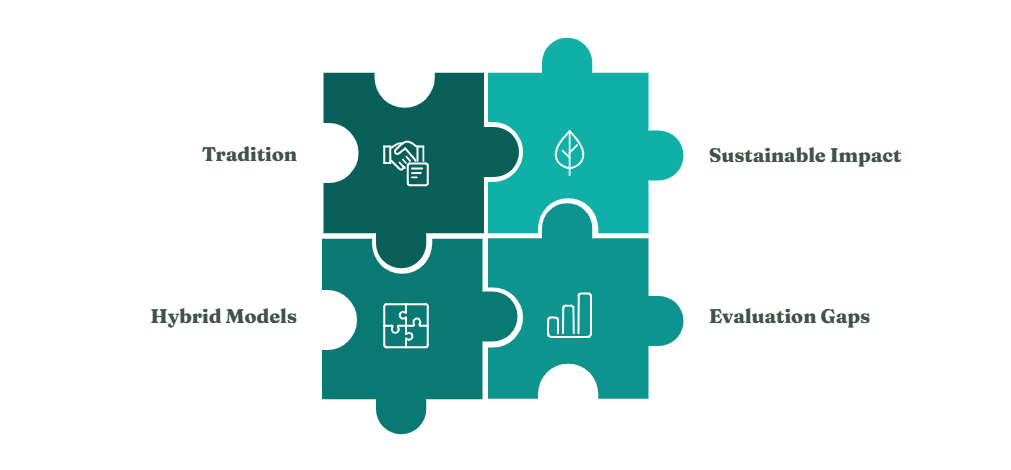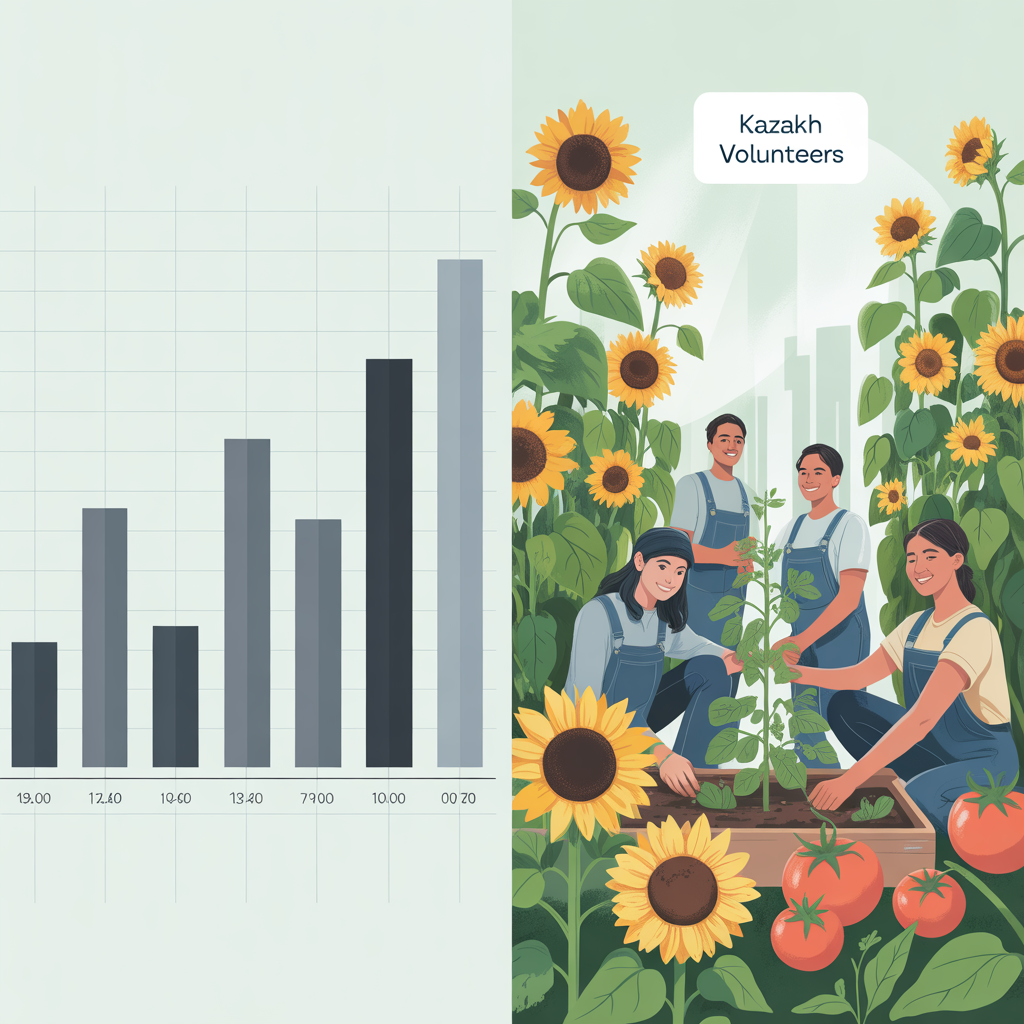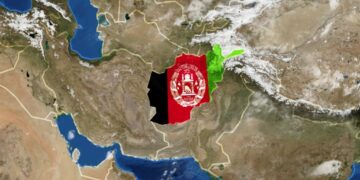COMMENTARY
Tatyana Sholudko
National Volunteer Network, Kazakhstan
This article is part of a special issue titled Bridging Power and Knowledge: Addressing Global Imbalances in Knowledge Systems for Sustainable Futures.
PLAIN-LANGUAGE SUMMARY
WATCH A SUMMARY OF THE ARTICLE
LISTEN TO THE PODCAST
Abstract
This article examines the dynamic landscape of Kazakhstan’s volunteer movement, highlighting its unique blend of traditional communal assistance practices, such as ‘asar,’ with contemporary organizational models. It argues that this hybrid approach fosters a distinct form of civic engagement deeply rooted in local cultural values. The study critically assesses the applicability of conventional volunteer evaluation metrics predominantly developed in the Global North, revealing their limitations in capturing the nuanced impacts and motivations within a Central Asian context. Furthermore, it explores the profound implications of this culturally adapted volunteerism for achieving sustainable development goals, advocating for a more context-sensitive understanding and support of grassroots initiatives. This research underscores the need for localized frameworks that acknowledge and leverage indigenous practices for effective social change.

Keywords: Kazakhstan, Volunteerism, Asar, Sustainable Development, Global North Metrics
Introduction
“For today’s volunteer, what matters is being not just a cog in the system, but a co-creator of change”.
These words, shared by a young leader from Kazakhstan during one of my coaching sessions, sparked deep reflection on how we evaluate social innovations across different parts of the world. In recent years, Kazakhstan’s volunteer movement has demonstrated something remarkable. During the 2024 spring floods, over 50,000 volunteers mobilized within days, combining traditional community organizing (asar) with modern digital coordination tools to evacuate populations and provide emergency aid (Amreeva & Sholudko, 2024). When traditional knowledge meets modern approaches, it creates viable solutions to global challenges.
However, as an expert and analyst with extensive field experience in Central Asian volunteer movements, I increasingly observe a troubling pattern: the Global North’s experience automatically becomes the benchmark and model to follow. At the same time, the voices of local communities in the Global South go unheard – their unique solutions and practices are dismissed as “not professional enough” simply because they don’t fit familiar evaluation metrics. This pattern reflects broader challenges when national reporting requirements for international frameworks prioritize quantitative growth over qualitative development.
Six years of monthly monitoring volunteer activity in Kazakhstan has led me to a crucial insight: sustainable development requires genuine dialogue between different knowledge systems. Perhaps it’s time to move beyond the dominant “the North teaches the South” paradigm and embrace the many paths to social change. (Figure 1).

Figure 1. Key elements of Kazakhstan’s volunteer movement approach to social innovation
INTEGRATION OF TRADITIONAL AND MODERN SYSTEMS IN KAZAKHSTAN
Historical Roots: From Asar to Modern Volunteering
Volunteering in Kazakhstan has deep roots in nomadic culture. Asar – an ancient Kazakh practice of collective communal work (literally meaning “all together” in Kazakh) – represented a sophisticated system of mutual support where community members would gather to help individual households with labor-intensive tasks like building houses, preparing for winter, or harvesting crops. This practice embodied the nomadic philosophy of shared responsibility and collective well-being. (Finke, 2019) This tradition stays strong today: whether responding to fires, searching for missing people, or organizing emergency aid, willing volunteers often outnumber our organizational capacity. This reflects the core elements of traditional culture – prioritizing those in need and maintaining readiness to help beyond necessity.
Registered volunteers at the start of the pandemic.
Projected volunteers, including informal participants.
Evolution Through Distinct Phases
Kazakhstan’s volunteering journey spans several distinct phases with evolving civic implications: from the Soviet era’s state-controlled “Timurite movement” to grassroots development after 1991 when volunteers became society’s backbone during challenging state transitions, addressing urgent needs the young state couldn’t meet. In the 2000s, volunteering transformed into conscious civic action exemplified by youth initiative groups that emerged independently from state structures – young people, driven by the desire for change, began forming initiative groups, drawing in more and more engaged citizens. The COVID-19 pandemic marked a turning point for Kazakhstan’s volunteer movement. This period highlighted the unique flexibility and resilience of local volunteer initiatives rooted in traditional mutual aid practices. “The pandemic pushed us to rethink our role and responsibility to society,” notes one volunteer community leader.
International Recognition and Deeper Meaning
Kazakhstan’s achievements in developing its volunteer movement have gained significant international recognition: at the President’s initiative, the UN General Assembly declared 2026 the International Year of Volunteers. In 2024, during the presentation of the first Regional Review on Volunteering in Central Asia at UN Headquarters, Kazakhstan was acknowledged as one of the region’s leaders in volunteer movement development. Yet behind these formal achievements lies something more meaningful – a unique experience of reimagining traditional practices for the modern world.
UNIQUE FEATURES OF REGIONAL DEVELOPMENT
During coaching sessions with volunteer leaders from the CIS and Central Asia in autumn 2024, I observed volunteering becoming more diverse, professional, and systematic, blending local traditions with modern approaches. In Kazakhstan, this is evident in several key areas:
Community Consolidation and Activism
In 2016, the community drove legislative change, securing the Law on Volunteer Activities. This success, rooted in public dialogue traditions, led to regional front offices, funding mechanisms, and recognition structures, maintaining a community-driven character. This reflects evolving civic engagement where traditional and modern forms intersect.
Rapid Response Capability
The community mobilizes quickly in crises. Examples include delivering 500+ tons of aid to Turkey in 2023 and establishing the Ukraine Humanitarian Support Hub, which became a sustainable social enterprise.
Social Focus and Clear Boundaries
Volunteering remains distinctly social, separate from religious or political activities. This neutrality fosters diverse collaboration and ensures state support targets volunteer initiatives specifically, despite frequent practical cooperation on common goals.
From One-Time Actions to Systemic Work
Initiatives increasingly develop into long-term programs. School groups, for example, move from single events to comprehensive support systems, driven by the belief that “Kindness must be effective.”
Development of Pro Bono Volunteering
Unlike the Global North, pro bono work naturally fits mutual aid traditions. Retired doctors share expertise, and people with disabilities teach inclusion, challenging notions of who can be an expert.
INTERGENERATIONAL DYNAMICS AND CULTURAL CONTEXT
Intergenerational Dynamics of Volunteering
One of the most striking markers of volunteering’s transformation is the changing perception of a volunteer’s role across generations. Young participants are emerging as passionate co-creators of social change, reflecting a cultural shift from hierarchy to horizontal connections. Instead of individual success models, we see a revival of nomadic mentoring traditions: success is measured not by personal achievements but by the ability to nurture new leaders. Experienced volunteers (average age ~35) bring deep understanding and professional skills, while young participants (from 14 years) contribute digital literacy and new project formats, creating productive alliances. This intergenerational knowledge transfer reflects broader patterns of civic engagement that strengthen community resilience (Dang & Seemann, 2022).
Regional Differences and the Role of Cultural Context
Traveling across Kazakhstan’s regions, I see how the blend of tradition and modernity manifests differently. In just a century of transition from nomadic to settled life, cultural dimensions have transformed. While traditional nomadic society valued collectivism and low power distance, modern society is more complex. Yet, basic values of mutual aid persist. According to World Values Survey data, Kazakhstan is at a unique transition point, creating fertile ground for civic initiatives (Inglehart-Welzel, 2023). Rural areas transform traditional mutual assistance into modern development formats. Industrial cities create environmental initiatives where the nomadic understanding of human-nature unity finds new expression. In major urban centers, volunteering actively promotes civil society by combining modern technologies with a centuries-old culture of social influence and mentorship.
IMBALANCE IN GLOBAL KNOWLEDGE SYSTEMS
In international practice, social innovations are evaluated primarily through quantitative indicators. As noted in the UNV State of the World’s Volunteerism Report (2022), this focus on formal, quantifiable data often underestimates and misrepresents volunteering in the Global South, where informal networks and qualitative impacts are paramount. This disconnect between formal evaluation frameworks and local realities reflects broader challenges in knowledge systems integration (Georgalakis & Siregar, 2023).
Working with volunteer communities in Central Asia, I see how quantitative metrics miss the most valuable aspect – deep social transformations that resist numerical measurement. This reflects a fundamental gap between Global North and South knowledge systems. International organizations apply Western evaluation standards that overlook key aspects like the quality of social connections, cultural transformations, and intergenerational knowledge transfer. (Figure 2).

Figure 2. Contrasting evaluation approaches: quantitative metrics versus qualitative community impact
Regional evidence from Central Asia confirms this pattern. The first Regional Review on Volunteering in Central Asia (2024) documented how traditional forms of mutual aid such as asar (Kazakhstan), ashar (Kyrgyzstan), khashar (Tajikistan, Uzbekistan), and yovar (Turkmenistan) demonstrate sophisticated systems of collective support that resist quantification through Western metrics. These practices remain invisible in international frameworks (UNV, 2022).
A Case Study: When Metrics Override Mission
This disconnect became particularly evident in my experience leading a school bullying prevention program in 2020-2021, supported by a major international organization. We decided to help all schools that reached out, exceeding our formal quantitative targets tenfold. By Western standards, this meant the project was complete, and funding was terminated. In reality, we had only highlighted the problem in numerous schools without ensuring the necessary depth of change. Thousands of students were left aware of the problem but without the tools to address it. This systemic contradiction, where success is measured by beneficiary numbers over sustainable change, is common in both government and international donor practices.
LOCAL ADAPTATIONS VS. STANDARDIZED MODELS
In my work, I often observe that initiatives don’t simply replicate international models but create unique solutions that consider local context and cultural specificities. While Western models often emphasize age-segregated programs and formal structures, Kazakhstan’s initiatives demonstrate different approaches focused on sustainable relationships, organic growth, and community ownership.
Best for Kids
Working with orphanage graduates since 2010, this initiative creates intergenerational integration where former residents mentor current ones, focusing on long-term relationships rather than short-term interventions.
LIDER.KZ
Evolving from a personal tragedy in 2008, this nationwide network of 500+ search and rescue volunteers learns through peer-to-peer mentorship and practical experience, not formal certification.
The Petroglyphs Hunters
Operating informally since the late 1990s, this group protected archaeological sites through grassroots advocacy before formalizing in 2023 to access state funding while maintaining their community-driven approach.
These examples illustrate how local solutions are focused on sustainable relationships, organic growth, and community ownership over standardized metrics and external validation. Regional analysis across Central Asia demonstrates that while traditional mutual aid practices like asar have operated effectively for centuries without formal measurement, contemporary attempts to integrate them into Western evaluation frameworks often distort their essence and reduce their effectiveness. Similar patterns of indigenous knowledge systems maintaining effectiveness despite formal measurement challenges have been documented globally (Acharya & Prakash, 2025). (UNV, 2024; Amreeva, 2024). The experience of Kazakhstan’s volunteer movement shows that solutions rooted in local understanding of social processes prove more sustainable. This becomes particularly evident in crisis situations, where traditional mutual aid mechanisms remain effective despite limited resources. However, attempts to ‘translate’ these achievements into the language of Western metrics distort the essence of unique local approaches. A genuine dialogue between different knowledge systems is essential – it is at the intersection of Western methodology and local wisdom that new approaches to understanding social effectiveness emerge.
VOLUNTEERING FOR SUSTAINABLE DEVELOPMENT GOALS
Kazakhstan’s volunteer movement shows a natural connection between local mutual aid practices and global goals, coming from traditional asar values rather than external donor requirements. This organic alignment demonstrates how community-led initiatives can achieve sustainable development outcomes through culturally grounded approaches (Bucio-Mendoza & Solis-Navarrete, 2024). This appears clearly in three key areas.
Social Volunteering and Reducing Inequality (SDG 10)
“Club 28 Petals,” a grassroots initiative supporting premature babies, grew organically since 2012 to operate in 14 countries with over 3,700 participants. During the 2024 floods, over 50,000 volunteers engaged in comprehensive relief, from first aid to reinforcing riverbanks.
Education as a Tool for Equality (SDG 4)
Student volunteers help rural schoolchildren prepare for university admission, bridging educational gaps. In Kazygurt village, a volunteer English-teaching initiative evolved into a modern trilingual education center. Volunteers also adapt materials for children with disabilities.
Environmental Volunteering and Ecosystem Protection (SDGs 13-15)
Volunteers in Atyrau preserve fish populations in the Ural River. The Wild Nature Volunteers movement protects national parks and promotes environmental education. Initiatives like “Aktobe, Breathe!” protect urban green spaces. These actions stem from local concerns, naturally aligning with global SDGs.
RETHINKING THE FUTURE OF SUSTAINABLE DEVELOPMENT: LESSONS FROM THE GLOBAL SOUTH
After six years of watching Kazakhstan’s volunteer movement transform, I reached an important conclusion: the Global South’s experience can significantly enrich our understanding of social innovation and sustainable development. This perspective aligns with growing recognition that responsible research and innovation must be reconceptualized from Global South perspectives (Wakunuma et al., 2021). The real value lies in the depth of personal and societal changes, which cannot be measured by numbers alone. Kazakhstan’s journey suggests several key directions for transforming existing approaches:
Flexible Evaluation Systems
We need flexible evaluation systems that consider cultural context and qualitative changes. Emerging examples across Central Asia show alternatives like measuring success through sustained mentor-mentee relationships or community ownership rather than participant numbers.
Platforms for Direct Dialogue
We need platforms for direct dialogue between different knowledge systems. Existing regional forums in Central Asia can be expanded into global platforms for systematic dialogue between Global North and South approaches, especially looking ahead to the 2026 UN International Year of Volunteers.
Reconsider Support Mechanisms
Support for social initiatives should favor local rather than international organizations. The super-mobilization of Kazakh volunteers shows that local communities create effective solutions even with minimal resources. Direct funding is essential to develop these initiatives.
Reframe the Global South’s Role
We should reconsider viewing the Global South as a space for implementing ready-made solutions. The future of sustainable development may require a new understanding of local communities’ role as co-creators of knowledge and practice, not just recipients of expertise.
CONCLUSION
The experience of Kazakhstan’s volunteer movement clearly shows: we should reconsider viewing the Global South primarily as a space for implementing ready-made solutions. Contemporary donor practices continue to prioritize standardized Western models, creating barriers for local participants and undermining traditional mutual aid practices like asar. Research on mutual aid organizing demonstrates that community-led responses offer crucial lessons for formal sectors serving marginalized communities (Wu et al., 2025). This approach perpetuates the assumption that Global South contexts must adapt to Northern standards rather than developing culturally-grounded alternatives. Central Asia suggests that the future of sustainable development may require not only new approaches but also a new understanding of local communities’ role in creating them. When volunteers act not just as implementers but as equal participants in shaping knowledge and practices, a living dialogue emerges between tradition and modernity, capable of enriching global social transformation practices. This experience points toward new possibilities for reframing relationships in both development practice and academic knowledge production, where local communities become co-creators rather than recipients of expertise. (Figure 3).

Figure 3. Collaborative future: Kazakhstan’s intergenerational volunteer movement building sustainable communities
ACKNOWLEDGEMENT
The author expresses sincere gratitude to the National Volunteer Network of Kazakhstan and the Ministry of Culture and Information of the Republic of Kazakhstan, whose support for volunteer initiatives made this research possible. Special thanks are extended to all volunteers and volunteer organizations who generously shared their experiences and insights, contributing to a deeper understanding of the development of the volunteer movement in Kazakhstan and Central Asia.
CONFLICTS OF INTEREST
The author declares no conflict of interest.
FUNDING
This project received funding from the 2024 Humboldt Residency Programme of the Alexander von Humboldt Foundation.
REFERENCES
Acharya, A., & Prakash, A. (2025). Integration of indigenous knowledge with scientific knowledge. Environmental Development, 55, Article 101024. https://doi.org/10.1016/j.envdev.2025.101024
Amreeva, E. (2024). Regional Study on the State of Volunteer Activities in Kazakhstan within the Framework of Preparing a Review on the State of Voluntary (Volunteer) Activities in the Central Asian Region. Using data from the 2023 Analytical Report, Expert-Analyst T. Sholudko. National Volunteer Network, Astana, 60 p.
Amreeva, E., & Sholudko, T. (2024). Review of Volunteer Activities in the Republic of Kazakhstan. National Volunteer Network, Astana, 48 p.
Bucio-Mendoza, S., & Solis-Navarrete, J. A. (2024). Institutionalising social innovation in the Global South: Lessons learned. Heliyon, 10(20), Article e39556. https://doi.org/10.1016/j.heliyon.2024.e39556
Dang, L., & Seemann, A.-K. (2022). Explaining civic engagement: The role of neighborhood ties, place attachment, and civic responsibility. Journal of Community Psychology, 50(3), 1736–1755. https://doi.org/10.1002/jcop.22751
Finke, P. (2019). Practices of traditionalization in Central Asia. Central Asian Survey, 38(3), 310–328. https://doi.org/10.1080/02634937.2019.1636766
Georgalakis, J., & Siregar, F. (2023). Knowledge translation in the Global South: Bridging different ways of knowing for equitable development. Institute of Development Studies. https://doi.org/10.19088/IDS.2023.028
Inglehart-Welzel. (2023). The Inglehart-Welzel World Cultural Map – World Values Survey 7. World Values Survey. Available at: http://www.worldvaluessurvey.org/
United Nations Volunteers (UNV) programme. (2021). 2022 State of the World’s Volunteerism Report: Building Equal and Inclusive Societies. UNV, Bonn, 40 p. Google Scholar
United Nations Volunteers (UNV) programme. (2024). Regional Review on Volunteering in Central Asia. UNV, Astana, 348 p.
Wakunuma, K., de Castro, F., Jiya, T., Inigo, E. A., & Blok, V. (2021). Reconceptualising responsible research and innovation from a Global South perspective. Journal of Responsible Innovation, 8(2), 267–291. https://doi.org/10.1080/23299460.2021.1944736
Wu, V. C. S., Russell, A. R., & Lawrence Scott, M. (2025). What can nonprofits learn from mutual aid organizing? Lessons from community-led crisis responses. Nonprofit Management and Leadership, 35(4), 567–585. https://doi.org/10.1002/nml.21644
ABOUT THE AUTHOR(S)

Bio – Expert and Analyst at the National Volunteer Network of Kazakhstan. With extensive experience leading volunteer projects, developing analytical frameworks, and coaching volunteer leaders across Central Asia, I provide insights from both methodological and practical perspectives within the movement I study.
Received: January 20, 2025
Accepted: July 15, 2025
Published: October 31, 2025
Citation:
Sholudko, T. (2025). Beyond familiar metrics: How Kazakhstan’s volunteer movement is reshaping our understanding of social innovation. SustainE, 3(1), 233–247. In A. Akinsemolu, A. Eimer, & S. Iqbal (Eds.), Bridging power and knowledge: Addressing global imbalances in knowledge systems for sustainable futures [Special issue]. https://doi.org/10.55366/suse.v3i1.12
Disclaimer: The opinions and statements expressed in this article are the author(s) sole responsibility and do not necessarily reflect the viewpoints of their affiliated organizations, the publisher, the hosted journal, the editors, or the reviewers. Furthermore, any product evaluated in this article or claims made by its manufacturer are not guaranteed or endorsed by the publisher.

Distributed under Creative Commons CC-BY 4.0











